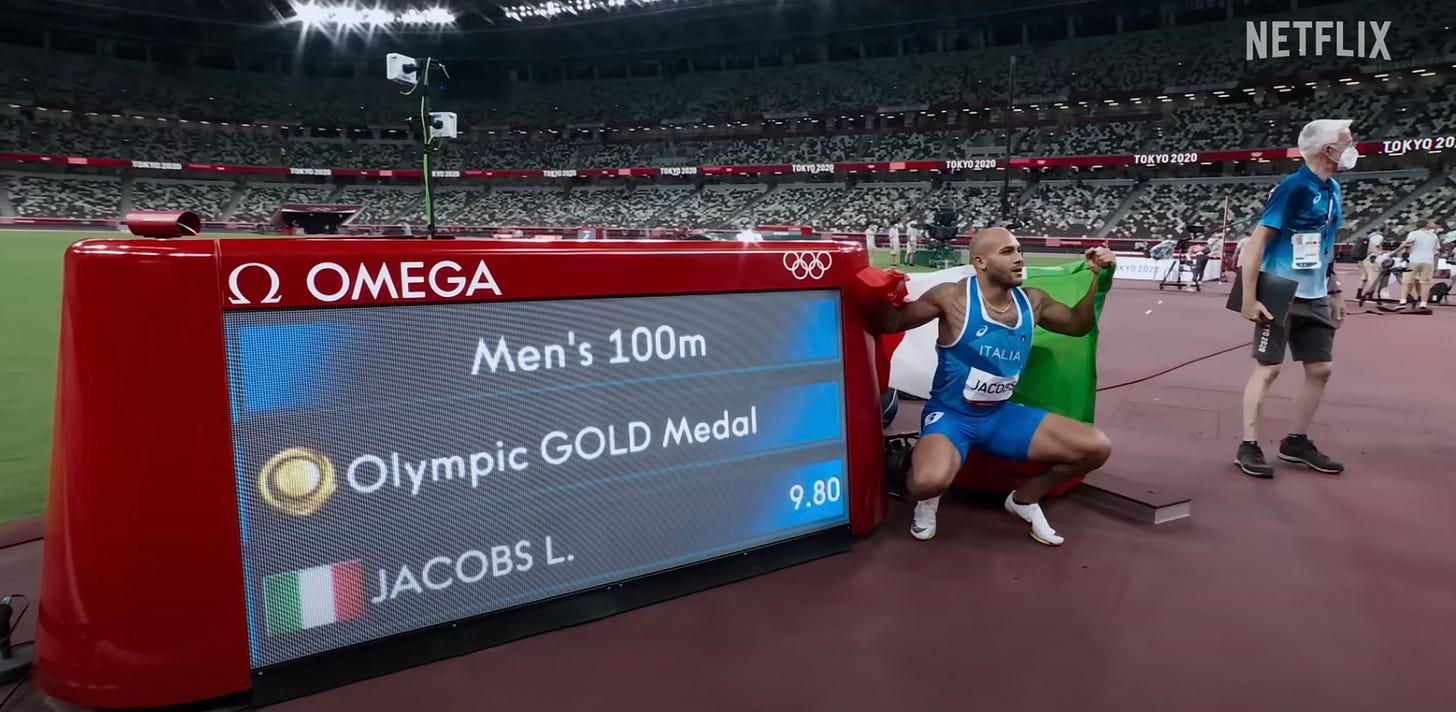People only care about your characters, not the plot
Whether it's quick scenes or a fully-fledged story you're telling, the audience can only invest in characters, not plot
I recently started watching Sprint on Netflix, which follows seven athletes in their journey to the 2024 Paris Olympic Games.
The men and women featured specialise in the 100m and 200m races, where the difference between winning and languishing behind can be measured in milliseconds.
So far, it’s been a fascinating glimpse into the world of world-class athletics, something I’ve always enjoyed and am looking forward to with the Olympics coming up soon.
It’s fascinating that years of training will come down to a race that only lasts 10 seconds, and a lot of drama and emotion comes from success and failure. As it’s individuals, it’s always personal, and there are real stakes.
While watching it, it did make me think about why we’re invested in not just these documentaries but sports in general.1
One of the big reasons sports is so popular is the number of storylines it creates. There are enough raw materials to create a narrative for any individual, team, or competition.
A team never just wins a championship; they’re either underdogs or the top team having to prove why they’re the best. An athlete isn’t just competing for the gold medal; they’re looking to cement their legacy and be remembered long after they retire.
A country qualifying for a major tournament like the Euros or World Cup is a tale of their past, present, and future.
Its players have their own stories. It could be someone’s last tournament before retirement, and winning the competition is the send-off they need or deserve.
It could be a young player’s chance to make their mark on the world stage, or there’s been a question mark hanging over a player’s career and this is the place to answer it.
All of this fed to the storyline of will he ever realise his potential and win on the world stage.
Bringing it back to Sprint, the first episode introduces us to Noah Lyles of Team USA, who won his first world title in October 2019. Having specialised in the 200m, we meet him as he plans to conquer the 100m.
He’s initially presented as brash and cocky, with a lot of swagger, but if you’re not familiar with him, you are unsure how that translates to his performances on the track.2
But what is interesting - and something sports documentaries do when they’re following competitors - is they show them in different parts of their life.
While not a spoiler, they have a section at Lyles’ home where he and his mother go through some childhood items. They touch upon the fact that Lyles has had asthma since he was a kid, his frequent visits to the hospital, and being excluded from sports.
While it’s not dwelled on too much, it does add an extra layer to his character and gives some idea as to how his personality formed. Therefore we identify with him in some way, and empathise with his personal trajectory.
Invest in Characters
The reason we get invested in shows like this is down to the people at the centre of it all. We’re seeing them in front of us, getting to know their hopes and fears, and relating to them.
We don’t need to know that someone has to win a race or break a record, we need to know what exactly it is that’s driving them.
Personal motivations are always the thing that pushes the scene forward, no matter what type of scene you’re doing.
Likewise, these characters have relationships and how they tie into their lives - sports documentaries tend to have coaches and athletes, or family members, which all bring a personal investment to it and further amplify these characters.
Even for scenes that don’t really have a story, like short scenes or ones that focus on game, the audience needs to hear why someone is driven to act a certain way or believe a certain thing.
You mightn’t be able to develop them deeply, but you can give a clear motivation or view that will help direct the scene.
For a story, you have to develop characters first before you can bring in events. If you don’t have characters, the show ends up being about the plot, and it’s very difficult to move away from that.
You end up with a show where everyone is talking about the thing, and it’s difficult to talk about anything else. When that happens, wild ideas are thrown out to keep things going and the audience is left unsure how to follow.
So, no matter what type of scene or show you’re doing, take care of your characters first and establish them.
The audience can only invest in the people they're seeing in a scene, so work on that, avoid talking about people we’re never going to meet, and go from there.
Anyone who correctly guessed it would be week 3 before I twisted something from pop culture into an improv thought, please collect your prize.
At the end of episode one, you get your answer, and no I’m not saying it here.


